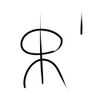Contionary:habai: Difference between revisions
Jump to navigation
Jump to search
m new CLCR code, replaced: x|socl → x|qsc (3) |
No edit summary |
||
| (11 intermediate revisions by the same user not shown) | |||
| Line 1: | Line 1: | ||
==Soc'ul'== | ==Soc'ul'== | ||
{{wacag|give_birth|newborn}} | |||
===Alternative forms=== | |||
{{alt|qsc|eb'ai}} | |||
===Etymology=== | ===Etymology=== | ||
{{ | {{qsc-inh|əpabai|equ-|papa-i<c:papa->}} {{cog|qsc|kisl|ekpabāe}} | ||
===Pronunciation=== | ===Pronunciation=== | ||
{{ | * {{IPA all|qsc|[ʔa˧ba˧j]}} | ||
===Verb=== | ===Verb=== | ||
{{ | {{qsc-v|erg}} | ||
# to give birth, to bear, to be the parent of | # to give birth, to bear, to be the parent of | ||
#: {{ux|qsc||}} | #: {{ux|qsc|Xauc āhíún'''habai''' R'úýan yan'in' xacud jutxux.|They say all anacondas and pelagornis are '''father'''ed by R'úýan'.}} | ||
===Adjective=== | ===Adjective=== | ||
{{ | {{head|qsc|adjective}} | ||
# newborn | # newborn | ||
| Line 19: | Line 23: | ||
===Synonyms=== | ===Synonyms=== | ||
{{sense|to give birth|to bear|to be the parent of}} | |||
{{col-auto|qsc|nál'az}} | |||
===Derived terms=== | ===Derived terms=== | ||
{{col-auto|qsc|bababai|habaiuóc|habaiuóc habai|mamabai|nanabai}} | {{col-auto|qsc|bababai|habaiuóc|habaiuóc habai|mamabai|nanabai}} | ||
Latest revision as of 03:14, 2 October 2025
Soc'ul'
| Wacag logographs |
|---|
  |
Alternative forms
Etymology
From Sekhulla əpabai, from Wascotl *equ-*papa-i. Cognate to Kilīmos-sāîl ekpabāe.
Pronunciation
Verb
habai ᴇʀɢ
- to give birth, to bear, to be the parent of
- Xauc āhíúnhabai R'úýan yan'in' xacud jutxux.
- They say all anacondas and pelagornis are fathered by R'úýan'.
Adjective
habai
- newborn
- (please add the primary text of this usage example)
- (please add an English translation of this usage example)
Synonyms
(to give birth, to bear, to be the parent of):